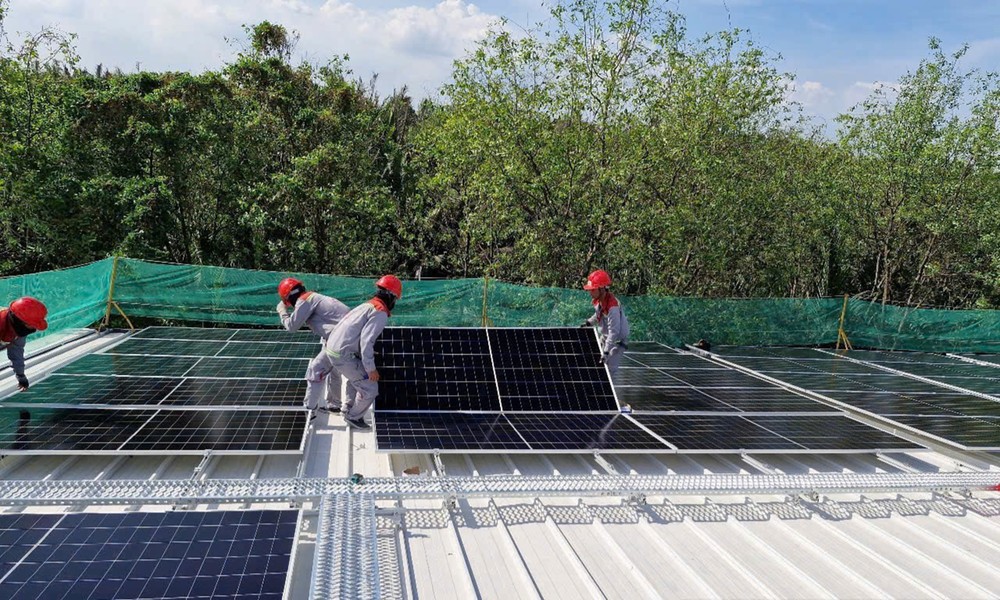
EVN has recently proposed that competent authorities introduce new regulations to penalize organizations and individuals who install and use rooftop solar power systems without prior registration or notification.
The proposal has sparked debate as it suggested that organizations and individuals who install rooftop solar systems for personal use without registering or notifying authorities could face penalties. The move aims to enforce existing regulations and ensure grid safety, but it has raised concerns among homeowners and businesses.
Residents and business owners are questioning the necessity of such a requirement. Resident Nguyen Thi Hai of Gia Lai Province’s An Binh Ward believes it's unreasonable to demand registration from households that use solar power solely for their own needs and don't sell excess electricity to the grid. Similarly, Duong Ngoc Thanh, who owns a textile factory in Ho Chi Minh City, said that he was encouraged by the push for solar energy, but found it illogical to consider non-registered systems a violation if they aren't connected to the EVN grid.
Many in Ho Chi Minh City express worry that the new regulations could lead to complicated administrative procedures, wasting time and discouraging potential solar adopters.
EVN, however, maintains that the measure is crucial for managing the power grid. According to the group, Decree 58/2025/ND-CP already requires all rooftop solar developers to notify the Department of Industry and Trade, local electricity units, and construction and fire prevention agencies. EVN's new proposal seeks to add a provision for administrative sanctions to ensure these notification obligations are legally binding.
A representative from Ho Chi Minh City Electricity Corporation explained that unregulated solar installations can create localized grid overload due to their intermittent power generation, which is dependent on weather conditions. This makes power dispatching and management difficult. The representative also pointed out a potential safety risk, noting that many homeowners use poor-quality, uncertified equipment, increasing the risk of electrical fires, explosions, and accidents that could impact an entire residential area.
The proposed penalties are intended to close a legal loophole and ensure compliance, prioritizing grid stability and public safety as rooftop solar adoption continues to grow across the country.
Industry experts urge simplicity in rooftop solar registration
The recent proposal by Vietnam Electricity (EVN) to penalize individuals and organizations who fail to register their rooftop solar systems has drawn mixed reactions. While industry experts acknowledge the need for data and grid stability, they are urging for a more streamlined and user-friendly approach to avoid discouraging solar adoption.
General Director Nguyen Quoc Viet of Vinasol Joint Stock Company emphasized the importance of a data-driven approach for the electricity sector. According to him, the industry needs a basis to collect data and statistics on output, capacity, and demand. However, he stressed that the process must be as simple as possible so that people do not feel inconvenienced.
Agreeing with General Director Nguyen Quoc Viet’s opinions, Deputy General Director Pham Dang An of Vu Phong Energy Group and a renewable energy expert said the registration process should be extremely simple and it can be done online and completed in a few days. He suggested that sanctions for non-compliance should only be used when there is a clear and present danger to the power system or the community. Deputy General Director Pham Dang An also called for a clear separation between data management and safety assessments to prevent conflicts of interest.
Energy experts believe that the current communication surrounding the policy, with its emphasis on penalties, has created unnecessary backlash. They argue that authorities should focus on promoting transparent declaration as a civic duty to ensure grid stability. In return, the Government must simplify the registration process to make it easy and accessible for everyone.
Head Nguyen Quoc Dung of EVN Business Department said that it is essential to provide installation and capacity information. Forecasting electricity demand is a critically important issue. It serves as the input data for both long-term and short-term operational planning. Additionally, for EVN, it forms the basis for preparing infrastructure, from transmission networks to distribution stations, to ensure electricity supply for the public. Currently, the amount of information provided is still very limited. Consequently, EVN lacks sufficient data to send to specialized units for them to calculate the electricity system.
Therefore, according to him, it is crucial for citizens and businesses to collaborate and responsibly provide data. This is precisely why EVN has proposed such penalties. The group observes that the current tools of EVN have been developed quite carefully and are user-friendly. In essence, this merely involves citizens supplying information about the solar power system, with no complicated procedures; it only requires the provision of installation information and capacity.
























